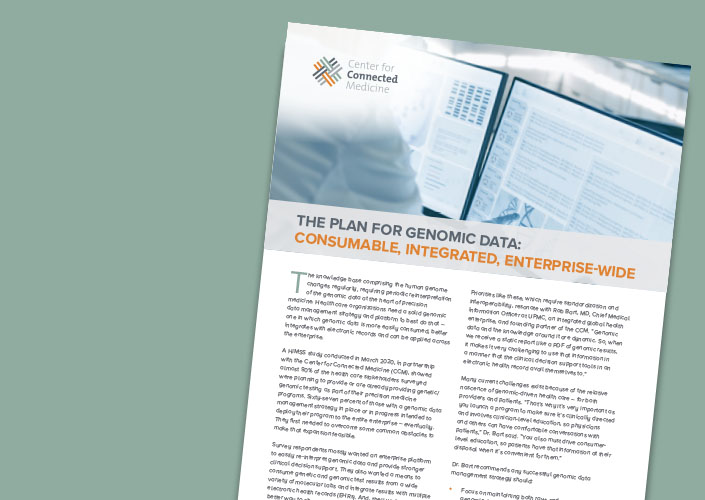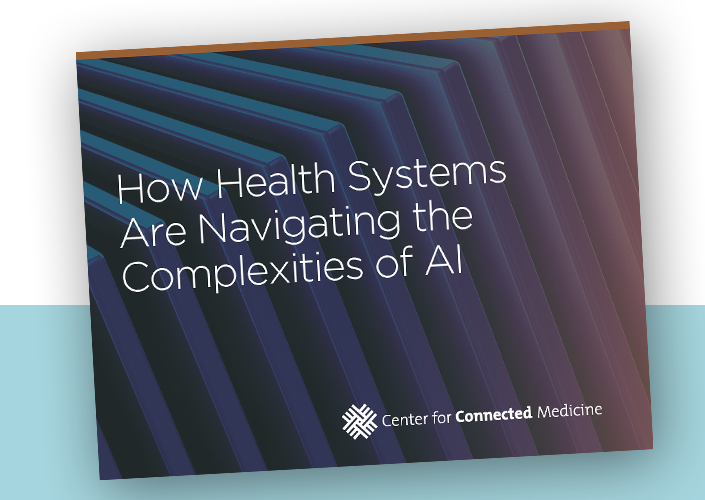UPMC’s chief medical information officer says health systems need an enterprise-wide approach to genomic data management; download executive response PDF
The knowledge base comprising the human genome changes regularly, requiring periodic reinterpretation of the genomic data at the heart of precision medicine.
Health care organizations need a solid genomic data management strategy and platform to best do that – one in which genomic data is more easily consumed, better integrates with electronic records and can be applied across the enterprise.
A HIMSS study conducted in March 2020, in partnership with the Center for Connected Medicine (CCM), showed almost 90% of the health care stakeholders surveyed were planning to provide or are already providing genetic/genomic testing as part of their precision medicine programs.
Sixty-seven percent of those with a genomic data management strategy in place or in progress intended to deploy their program to the entire enterprise – eventually.
Standardization, interoperability are key for genomic data management
They first needed to overcome some common obstacles to make that expansion feasible.
Survey respondents mostly wanted an enterprise platform to easily re-interpret genomic data and provide stronger clinical decision support. They also wanted a means to consume genetic and genomic test results from a wide variety of molecular labs and integrate results with multiple electronic health records (EHRs). And, they wished for a better way to share results with providers and patients.
Priorities like these, which require standardization and interoperability, resonate with Rob Bart, MD, Chief Medical Information Officer at UPMC, an integrated global health enterprise, and founding partner of the CCM. “Genomic data and the knowledge around it are dynamic. So, when we receive a static report like a PDF of genomic results, it makes it very challenging to use that information in a manner that the clinical decision support tools in an electronic health record avail themselves to.”
Many current challenges exist because of the relative nascence of genomic-driven health care – for both providers and patients. “That’s why it’s very important as you launch a program to make sure it’s clinically directed and involves clinician-level education, so physicians and others can have comfortable conversations with patients,” Dr. Bart said. “You also must drive consumer-level education, so patients have that information at their disposal when it’s convenient for them.”

Dr. Bart recommends any successful genomic data management strategy should:
• Focus on maintaining both raw- and variant-level genomic data
• Work toward standardization – both internally and across the industry
• Use raw genomic data actively to integrate into EHRs for clinical decision support
“If pharmacogenomic results for a medication that’s routinely prescribed … show that it is not effective in a specific individual, a second medication can be utilized to meet the needs of the patient. That ultimately translates to better care and reduced costs.” Rob Bart, MD, Chief Medical Information Officer, UPMC
Case studies, associations, academic medical centers provide best practices
The HIMSS study also indicated most health care leaders currently turn to case studies and peer associations for best practices in this specialized field, including academic medical centers such as UPMC, which are at the forefront of precision medicine and the genomic data management that goes along with it.
For instance, UPMC is broadening its role in pharmacogenomics under the clinical and scientific leadership of the following specialists: UPMC Executive Vice President and Chief Medical and Scientific Officer at UPMC Steven Shapiro, MD; Steven E. Reis, MD, Associate Vice Chancellor for Clinical Research, Health Sciences at the University of Pittsburgh; and Philip Empey, PharmD, PhD, Associate Director for Pharmacogenomics at the University of Pittsburgh and UPMC Institute for Precision Medicine.
Through strategic partnerships, UPMC in 2015 launched a genomic data-driven program to fine-tune a medication regimen commonly prescribed to patients undergoing cardiac catheterization. The program’s initial successes have led UPMC to include more patients and a broader number of gene-drug pairs, making it one of the largest pharmacogenomics testing programs in the U.S. today.
Integral to the UPMC precision medicine strategy is the ability to sequence DNA and RNA and rapidly provide analysis of genetic defects. UPMC does this through the UPMC Genome Center, a high-throughput CAP-accredited and CLIA-certified lab with compute-intensive data processing.
Greater goal is lower costs, improved outcomes for patients
Additionally, because UPMC is an integrated delivery and financial system with its own health plan, the health system is better positioned to improve care delivery and create savings from the program. “If pharmacogenomic results for a medication that’s routinely prescribed as a standard of care show that it is not effective in a specific individual, a second medication can be utilized to meet the needs of the patient. That ultimately translates to better care and reduced costs,” Dr. Bart explained.
That greater goal of improved patient outcomes and lower cost of care can be realized across organizations and the health care industry.
“We still have a fairly long road to go in health care to deliver on the broad value of precision medicine,” Dr. Bart said. “But, it’s important for everyone to remember there is a measurable precision medicine footprint, and every health care system has experienced benefits to date.
“Now, what needs to occur in health care is for the breadth and depth of precision medicine to really take hold so it’s available to a much broader patient and consumer base. And, the only way to have that happen is if we continue to invest in precision medicine so all of us can truly benefit from it.”
Learn more about genomic data management
The CCM has additional resources on genomic data management at health systems.
Download the research report, “Genomic Data in Health Systems,” to read about results from a survey of health systems.
View key findings from the research report and download an infographic.



